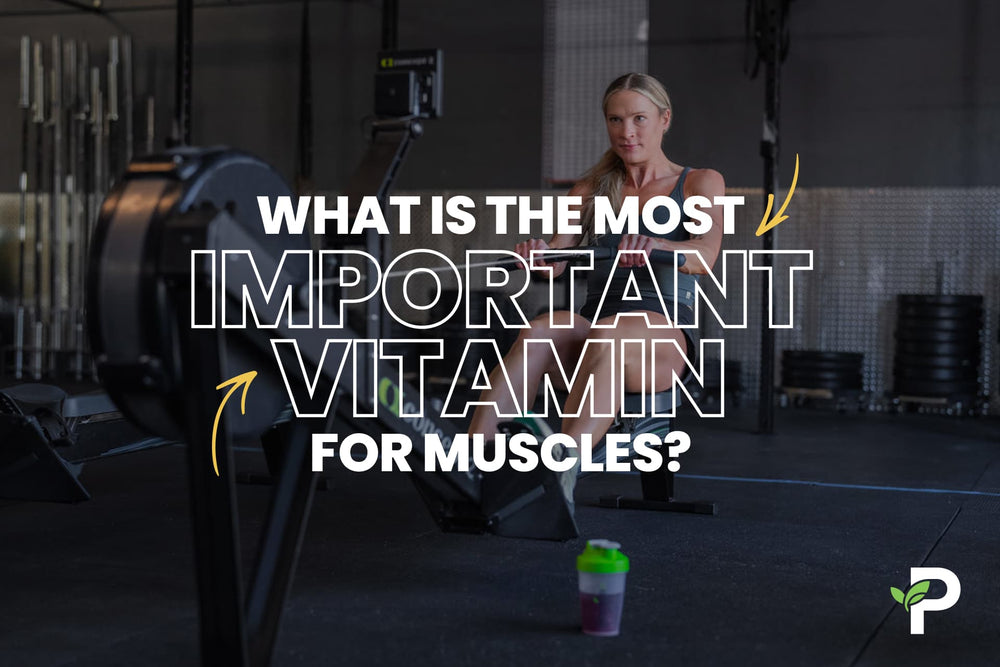If you suffer from painful joints, you’ve probably wondered what kind of supplements you should be taking. With all the joint health supplements on the market, deciding which ones are right for you can be difficult. Let’s examine some of the key differences in joint health supplements, go over some common vitamin deficiencies that can lead to joint pain, and talk about some of the best supplements to support your joints.
What Supplements Are Good for Joint Pain in Men?
When looking to treat joint pain with dietary supplements, it's important to understand the underlying cause of your pain. For example, one joint supplement that may help with knee osteoarthritis might not be as effective for symptoms caused by other medical conditions. Nutritional supplements designed to support joint health can also provide additional benefits when used alongside other treatments. Some of the most common joint issues in men include gout, osteoarthritis, and joint issues from low testosterone.
Gout
This type of arthritis typically impacts the big toe, ankles, or knees and is caused by a buildup of uric acid crystals in the joints. This buildup leads to severe inflammation and sudden, severe joint pain.
Osteoarthritis
This is the most common form of arthritis in men and is often referred to as “wear and tear arthritis.” Osteoarthritis occurs when the protective cartilage in the joints breaks down over a period of time and can cause joint pain and stiffness as well as reduced mobility. Joints most typically affected by osteoarthritis are the back, lumbar spine, knees, hips, and hands. Nutritional supplements like glucosamine and chondroitin are often used to treat arthritis pain caused by osteoarthritis and support overall joint health.
Rheumatoid Arthritis Pain
Rheumatoid Arthritis (RA) is an autoimmune disease that causes the body to attack its own tissue, often resulting in inflammation and pain. While the underlying cause of rheumatoid arthritis is different from wear and tear pain, the symptoms of arthritis can often overlap. These symptoms can include joint pain, stiffness, swelling, and more.
Joint Pain from Low Testosterone
Suffering from low testosterone is called hypogonadism. This can cause joint pain and an increased risk of developing arthritis. Since testosterone helps your body maintain bone density and muscle mass, lower levels can lead to weakened bones and joints. One of the primary long-term risks of low testosterone is osteoporosis. Different from the typical joint pain that develops in arthritis, osteoporosis can actually lead to fragile bones.
Best Joint Supplements for Men
Thorne Curcumin Phytosome 1000mg
Curcumin is a powerful anti-inflammatory (which we get into below), and this supplement from Thorne is certified for sport, includes clinically studied curcumin, and is gluten, dairy, and soy-free. It is often recommended for those dealing with severe pain from conditions like arthritis, as it helps reduce inflammation effectively. For those seeking additional resources or guidance on managing joint pain, organizations like the Arthritis Foundation can provide valuable information.
Vital Proteins Collagen Peptides
Collagen is high in amino acids, which reduce joint pain, improve joint function, and support cartilage repair. Vital Proteins Collagen Peptides is certified for sport, mixes with hot or cold liquids, and contains around 18g of protein per serving.
Previnex Joint Health PLUS®
Combining NEM® and Boswellin®, the ingredients in Joint Health PLUS® have strong clinical data on inflammation, pain relief, and cartilage protection! Using only high-quality ingredients, the main active ingredients in Joint Health PLUS have been shown to decrease joint pain and stiffness, as well as improve joint flexibility.
What Is the Best Supplement for Painful Joints?
Some of the best supplements for joint pain are glucosamine, turmeric, fish oil, MSM (methylsulfonylmethane), and Boswellia.
Glucosamine
While glucosamine is found naturally in your cartilage, it is also available in supplement form. It can be harvested from shellfish or concocted in a lab and can be used to decrease inflammation and relieve pain—especially if you suffer from osteoarthritis of the knee. Given that glucosamine already exists in your body, when taken in supplement form, its primary function is to support your existing cartilage and help make it stronger.
Turmeric
Coming from Curcuma longa, turmeric is one of the most powerful (and most popular) anti-inflammatories for joint pain.
Fish Oil
The omega-3 fatty acids present in fish oil can help reduce inflammation and keep your joints lubricated. In particular, fish oil can help with pain, stiffness, and joint tenderness in those struggling with rheumatoid arthritis.
MSM (Methylsulfonylmethane)
In a study of 100 adults aged 50 or older, participants took an MSM supplement or a placebo. The MSM supplement also included Vitamin C, Collagen, Neem extract, and Corydalis extract. Those who took the MSM showed a reduction in joint pain, stiffness, and swelling.
Boswellia
This supplement has been shown to help relieve joint pain, improve joint function, and reduce joint stiffness. There have been multiple clinical trials/studies done on the effectiveness of Boswellia on joint pain conditions such as osteoarthritis, all of which have shown positive improvements in participants’ joint pain.
What Vitamin Am I Lacking If My Joints Hurt?
Both vitamin D and C are crucial for the maintenance of joint health. Vitamin D promotes calcium absorption, which is essential for our joints. Optimal calcium absorption produces strong, healthy bones. Vitamin C is a powerful antioxidant that can help reduce joint inflammation and swelling. Vitamin C also has another job to do, which is to help make collagen to protect joints and bones.
Some common symptoms of vitamin deficiency are:
- Swelling
- Stiffness
- Decreased range of motion
- Fatigue
- Bone pain
- Muscle pain
- Numbness
- Weakness
- Bone degeneration
Joint pain is typically associated with inflammation. By ensuring your diet is rich in these vitamins and minerals, you’ll strengthen your joints and muscles and, therefore, may prevent inflammation and joint pain.
One of the best ways to get those joint-supporting vitamins is through your diet. Foods high in vitamins include:
- Fatty fish
- Liver
- Leafy greens
- Eggs
- Mushrooms
- Vitamin-fortified milk (both dairy and non-dairy)
Read our blog on "Can too much vitamin D cause joint pain?"
What’s the Number One Joint Pain Reliever?
To help relieve the pain you’re experiencing, there are over-the-counter (OTC) pain relievers like Tylenol and NSAIDs (such as Ibuprofen and Aspirin). However, synthetic pain relievers can come with an array of side effects, especially if you take them long-term (which is not recommended). While OTC pain relievers help in the short term, it’s best to find supplements that can relieve your pain long-term.
According to the Arthritis Foundation (AF), the most commonly advertised and used supplements for joint pain are glucosamine and chondroitin, alone or in combination. However, there are many other supplement options to give long-term relief, such as:
- Fish oil
- Collagen
- Omega-3 Fatty Acids
- Vitamin D
- Turmeric (curcumin)
- Boswellin®
- Vitamin C
- NEM® (a clinically studied form of natural eggshell membrane)
Read more about "What Is The Best Supplement For Arthritis?"
Which Is Better For Joint Pain, Turmeric Or Glucosamine?
No matter what supplements you choose, always consider the source. Be sure to use a supplement that has been scientifically tested. Many supplements on the market are full of junk and poor-quality ingredients. That’s why here at Previnex®, we test everything with pharmaceutical-grade precision. Turmeric and Glucosamine are two of the most highly recommended supplements for joint pain. Let’s compare them:
Benefits of Turmeric for Joint Health
According to Mary-Eve Brown, R.D.N., C.S.O., L.D.N., “Anyone who’s trying to manage inflammation could benefit from adding some turmeric to their foods.” Turmeric is high in compounds that can work to lower inflammation in the body (namely, curcumin). It alleviates joint pain by decreasing inflammation and swelling, allowing for greater mobility and less discomfort. Turmeric also has significant antioxidant properties, which can shield cells from the harmful effects of free radicals.
Benefits of Glucosamine for Joint Health
Glucosamine either comes from shellfish or is created in a lab. It boosts joint health and mobility by reducing inflammation and encouraging cartilage growth. Those who struggle with osteoarthritis frequently use glucosamine as a supplement to help their joints stay healthy and mobile. Since glucosamine is already naturally present in your cartilage, supplementing with it can be helpful in supporting the cartilage throughout your body, especially if you’re dealing with any sort of cartilage breakdown.
Turmeric vs. Glucosamine
When it comes to joint pain, the biggest difference between glucosamine and turmeric is that glucosamine is great at building and repairing cartilage, while turmeric helps ease joint pain and reduce swelling. While turmeric is well-known for its antioxidant qualities that may help shield joint tissues from damage, glucosamine is better at enhancing joint functionality, thus allowing for better movement.
If you’re looking for a one-stop joint health supplement, we recommend Previnex Joint Health PLUS®. This clinically proven formula contains two clinically studied ingredients not found in combination in any other joint health supplement: NEM® and Boswellin®. The main active ingredients in Health PLUS® are clinically proven to reduce joint pain and stiffness and restore flexibility in as little as 7-10 days while protecting joint cartilage from breakdown. Boswellin is also a powerful anti-inflammatory and pain reliever. Grab your bottle today!






